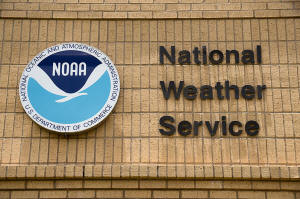Trump appointees have ties to companies that stand to benefit from
privatizing weather forecasts
[July 10, 2025]
By BRIAN SLODYSKO and MICHAEL BIESECKER
WASHINGTON (AP) — As commerce secretary, Howard Lutnick oversees the
U.S. government’s vast efforts to monitor and predict the weather.
The billionaire also ran a financial firm, which he recently left in the
control of his adult sons, that stands to benefit if President Donald
Trump's administration follows through on a decade-long Republican
effort to privatize government weather forecasting.
Deadly weekend flooding in central Texas has drawn a spotlight to budget
cuts and staff reductions at the National Weather Service and the
National Oceanic and Atmospheric Administration, two agencies housed
within the Commerce Department that provide the public with free climate
and weather data that can be crucial during natural disasters.
What’s drawn less attention is how the downsizing appears to be part of
an effort to privatize the work of such agencies. In several instances,
the companies poised to step into the void have deep ties to people
tapped by Trump to run weather-related agencies.
Privatization would diminish a central role the federal government has
played in weather forecasting since the 1800s, which experts say poses a
particular harm for those facing financial strain who may not be able to
afford commercial weather data.
The effort also reveals the difficulty that uber wealthy members of
Trump's Cabinet have in freeing themselves from conflicts, even if they
have met the letter of federal ethics law.

“It’s the most insidious aspect of this: Are we really talking about
making weather products available only to those who can afford it?” said
Rick Spinrad, who served as NOAA administrator under President Joe
Biden, a Democrat. “Basically turning the weather service into a
subscription streaming service? As a taxpayer, I don’t want to be in the
position of saying, ‘I get a better weather forecast because I’m willing
to pay for it.’”
The White House referred requests for comment to the Commerce
Department, which said in a statement that Lutnick has "fully complied
with the terms of his ethics agreement with respect to divesture and
recusals and will continue to do so.”
Trump nominees have ties to weather-related industries
Privatizing weather agencies has long been an aim of Republicans. During
Trump's first presidency, he signed a bill that utilized more private
weather data. And Project 2025, a proposed blueprint for Trump's second
presidency that was co-authored by his budget director, calls for the
NOAA to be broken up and for the weather service to “fully commercialize
its forecasting operations.”
Lutnick is not the only one Trump nominated for a key post with close
relationships to companies involved in the gathering of vital weather
data.
Trump’s pick to lead the NOAA, Neil Jacobs, was chief atmospheric
scientist for Panasonic Weather Solutions and has been a vocal proponent
of privatization. The president’s nominee for another top NOAA post,
Taylor Jordan, is a lobbyist with a roster of weather-related clients.
“If confirmed, Dr. Jacobs and Mr. Jordan will follow the law and rely on
the advice of the Department’s ethics counsel in addressing matters
involving former clients,” the Commerce Department said in its
statement.
Elon Musk, the world’s richest man, who spent more than $250 million to
help elect Trump, owns a controlling interest in SpaceX and its
satellite subsidiary Starlink. Both are regulated by the NOAA’s Office
of Space Commerce, which lost about one-third of its staff in February
layoffs facilitated by the Department of Government Efficiency, which
Musk helped create.

SpaceX also stands to gain through a new generation of private and
federally funded weather satellites that would be carried into orbit on
its rockets.
Though Musk has now departed Washington and had a very public falling
out with Trump, the DOGE staffers he hired and the cuts he pushed for
have largely remained in place.
Emails seeking comment sent to a lawyer who has represented Musk, as
well as to media contacts at his companies X and SpaceX, received no
response.
While Musk is focusing on his companies, others with potential conflicts
remain immersed in government work.
Lutnick ran Cantor Fitzgerald
Lutnick resigned as CEO of Cantor Fitzgerald, an investing behemoth,
upon taking office and began the arduous task of divesting his
interests, as required by law.
His two 20-something sons were given the reins of his financial empire.
Brandon Lutnick was named chairman of Cantor, while Kyle Lutnick was
tapped to be executive vice chairman. But his most recent ethics filing
from June 19 stated that he was still selling his holdings in the firm.
[to top of second column]
|

The National Weather Service monitoring station is seen in
Brownville, Texas, May 23, 2014. (Valley Morning Star/Valley Morning
Star via AP, File)

An ethics plan submitted in February states Lutnick would request a
waiver allowing him to participate in matters that would have a
“direct and predictable effect” on his family’s business while he
was still divesting. Securities and Exchange Commission filings,
meanwhile, show Lutnick has agreements to transfer his shares in the
Cantor companies and a family trust to his son Brandon.
The Department of Commerce referred questions about Lutnick's ties
to Satellogic, a satellite company that offers natural disaster
imagery, to his former firm.
Cantor spokesperson Erica Chase said that since Lutnick’s
resignation from the company, he has not made any decisions with
respect to the company’s investments or customer positions, or other
operational matters.
“Cantor and its subsidiaries operate in heavily regulated
industries, and maintain robust compliance programs to ensure
compliance with all applicable laws,” Chase said.
Federal officials are barred from making decisions that benefit the
business holdings of themselves or their spouses, but that
prohibition does not extend to assets held by their adult children,
according to Richard Painter, who served as the chief White House
ethics lawyer during Republican George W. Bush's administration.
Among its legion of disparate businesses, Cantor has interests in
weather and climate. It owns a controlling interest in BGC Group,
which operates a weather derivatives marketplace that essentially
allows investors to bet on climate risk and where hurricanes will
make landfall.
Lutnick also played a pivotal role in cultivating Satellogic. He
helped raise the capital to take the company public and held a seat
on its board until Trump nominated him. Cantor holds a roughly 13%
stake in Satellogic, according to a March SEC filing.
The company now bills itself as an emerging federal contractor that
can offer crisp images of natural disasters and weather events in
real time, which in 2021 Lutnick said makes it “uniquely positioned
to dominate the Earth Observation industry.”

While Lutnick was still in charge of Cantor, it paid a $6.75 million
fine to the SEC after it was accused of making misleading statements
to investors about Satellogic and another company. The White House’s
2026 spending plan, developed by Trump’s budget director and primary
Project 2025 architect Russell Vought, proposes $8 billion in cuts
for future NOAA satellites, which capture imagery of the planet
provided to the public.
Satellogic stands to benefit if the government retreats from
operating climate-monitoring satellites.
2 Trump nominees have ties to weather companies
Jacobs, Trump’s pick to lead the NOAA, led the same agency on an
acting basis during Trump’s first term.
He is scheduled to appear Wednesday before a Senate committee
weighing his nomination. Jacobs has long advocated for a greater
role for the private sector in government weather forecasting.
During a 2023 hearing focused on the future of the NOAA, he argued
that the agency needed to be “relying more heavily on the commercial
sector.”
He also has expressed concerns about what happens to commercial data
purchased by the government. “They give it away to the rest of the
planet for free,” he testified before Congress in 2023.
He was a consultant at the time for Spire Global and Lynker, both of
which have millions of dollars in weather data contracts with the
NOAA, according to records including his most recent financial
disclosure.
Jordan, Trump’s pick for another top NOAA post, has similarly close
relationships. His financial disclosure lists more than a dozen
weather-related lobbying clients, including Spire and Lynker. He
also represented AccuWeather, a commercial forecast provider, before
Congress and in meetings with the Commerce Department on “issues
related to private sector weather forecast improvement,” according
to lobbying disclosures.
Though his nomination is pending before the Republican-controlled
Senate, disclosure reports show he still represents weather and
space companies and is still listed as a principal employee at a
Washington lobbying firm.
All contents © copyright 2025 Associated Press. All rights reserved |